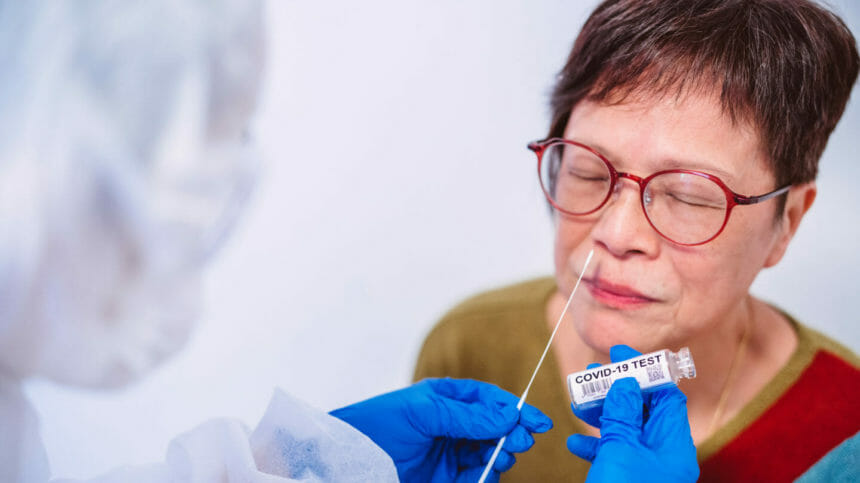
Fully vaccinated nursing home workers and other healthcare personnel who are asymptomatic can be exempt from expanded COVID-19 testing under new recommendations unveiled Tuesday by the Centers for Disease Control and Prevention.
Coronavirus testing requirements for fully vaccinated nursing home residents also have been eased, according to the new guidance.
CDC is recommending that vaccinated workers who are either symptomatic or in close contact with a person who has COVID-19 still have a series of two viral tests for the disease, with testing being recommended immediately and again five to seven days after exposure. Unvaccinated workers also should continue to submit to regular testing, according to the guidance.
The Centers for Medicare & Medicaid Services followed the CDC’s lead by issuing a memo late Tuesday solidifying the revised testing requirements for long-term care.
The relaxation of testing is expected to help ease some of the burden on providers who’ve done a lot of routine testing, “which takes time and resources, according to Amy Stewart, vice president of education and certification strategy, for the American Association of Post-Acute Care Nursing (AAPACN).
“This could provide added incentive for additional staff to get vaccinated, fewer testing,” she told McKnight’s Long-Term Care News on Tuesday. “Many staff report that while they understand the need for all the testing, they are tired of having to go through it.”
Testing recommendations for nursing home workers in the wake of a COVID-19 outbreak remain unchanged, regardless of vaccination status.
“In nursing homes with an outbreak of SARS-CoV-2, HCP and residents, regardless of vaccination status, should have a viral test every 3-7 days until no new cases are identified for 14 days,” the guidance states.
The American Health Care Association/National Center for Assisted Living said the new guidance “reinforces the importance of getting vaccinated, so we can get back to doing the things we enjoy.”
“This is critical to improve residents’ quality of life and also will encourage others to get vaccinated,” the association said in a statement Tuesday.
“We are pleased to see the new recommendations from CDC and the corresponding change to requirements from CMS that allow greater flexibilities for fully vaccinated staff, residents, and their visitors,” added Ruth Katz, LeadingAge’s senior vice president of policy.
The updated guidance also allows fully vaccinated nursing home residents to resume dining activities without masking or social distancing restrictions. If unvaccinated residents are present then social distancing requirements and masking should remain in place.
Stewart added that staff, resident and family education will be key for this recommendation.
“You could have two residents who have eaten together for years and one is vaccinated and the other is not, what do you do,” she speculated. “Providers might initially think it is appropriate to put all vaccinated residents together and non-vaccinated residents together but they must ask, is this what the resident wants? We have to consider the resident’s choice and voice into decisions.”
Additionally, the new guidance permits visitations and personal contact among residents and visitors who are fully vaccinated. If visitors and residents are both fully vaccinated, they can visit without masks and without social distancing as long as they are alone in their room or in a visitation room without unvaccinated individuals.
Stewart suggested that providers consider how these revisions impact both their policy and process and “revise both accordingly.”
“In addition, the CDC guidance talks about offering education to visitors. This will require some preparation and planning,” Stewart explained. “Leadership should develop and distribute education and information that explains the nuances so when families arrive, they aren’t surprised.”





